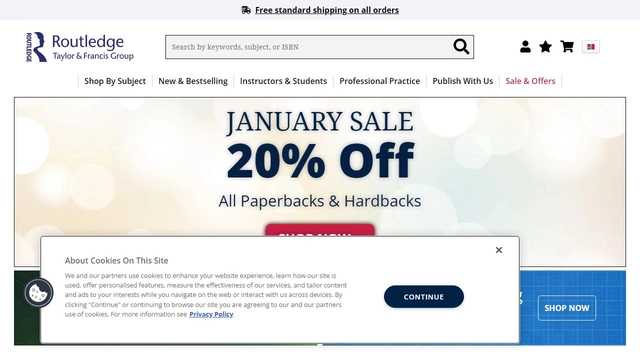Routledge Affiliate Program

Key Features of Routledge Affiliate Program
How to Join Routledge Affiliate Program Step by Step
Before applying to join the program, take time to review all requirements and terms. This will help you understand if the program matches your promotional capabilities and audience interests in the Books space.
Follow these steps to become a Routledge affiliate:
- Choose your registration method from the available options
- Submit application and wait for approval (1-2 days)
- Get your tracking links and start promoting
The program is available through affiliate networks.
Target Audience for Routledge
Understanding the target audience is crucial for success in affiliate marketing. By creating content that resonates with these specific demographics, you'll increase conversions and maximize your commission earnings.
The target audience for Routledge encompasses a diverse group of individuals and institutions that value high-quality scholarly literature and resources. This audience prioritizes access to peer-reviewed content that supports their academic, professional, and educational pursuits. They seek reliable, authoritative works that contribute to their fields of study or practice, fostering a robust academic environment and enhancing their knowledge base.
Primary Audiences
- Academics: University professors and researchers who rely on cutting-edge literature to support their teaching and research agendas.
- Educators: Teachers and educational administrators seeking resources to enhance curriculum development and foster student learning.
- Students: Graduate and undergraduate students pursuing advanced studies in humanities and social sciences, looking for authoritative texts and research material.
- Professionals: Practitioners in fields such as psychology, education, and the performing arts who need access to current scholarly resources to inform their work.
Key Customer Characteristics
- Research-Oriented: Customers are typically engaged in research and seek out peer-reviewed materials that contribute to academic discourse.
- Value Quality: The audience prioritizes high-quality content that is well-researched and meets academic standards.
- Diverse Interests: The audience has varied interests across multiple disciplines, reflecting the extensive range of topics covered by Routledge.
- Lifelong Learners: Many customers are committed to continuous learning and professional development, actively seeking out new resources to enhance their knowledge.
